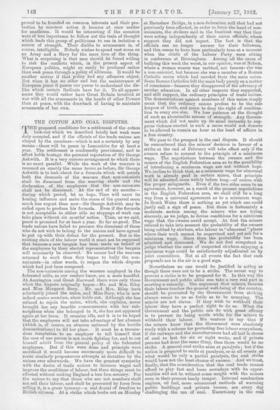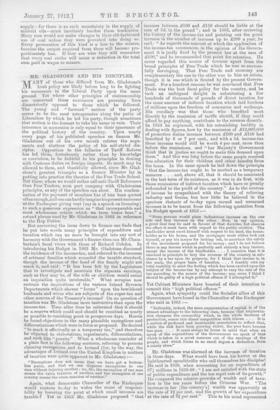THE COTTON AND COAL DISPUTES.
THE proposed conditions for a settlement of the cotton lock-out which we described briefly last week were duly accepted, and if the officials of the trade unions are obeyed by the members—which is not a certainty by any moans—there will be peace in Lancashire for at least a year. The settlement is confessedly provisional, and in effect holds hostage the personal reputation of Sir George Askwith. It is a very curious arrangement to which there is no exact parallel. -While the work of the weavers is resumed on exactly the same terms as before, Sir George Askwith is to look about for a formula which will satisfy both the demands of the weavers that non-unionists shall be dismissed from the weaving sheds and the declaration of the employers that the non-unionists shall not be dismissed. At the end of six months— during which period, let us hope, Time will exert its healing influence and make the cause of the quarrel seem much less urgent than now—Sir George Ask with may be called upon to produce his formula. Even if the formula is not acceptable to either sido no stoppage of work can take place without six months' notice. Thus, as we said, peace is promised for at least a year. So far so good. The trade unions have failed to procure the dismissal of those who do not wish to belong to the unions and have agreed to put up with their defeat for the present. But in the existing state of the labour world it must not be supposed that because a new bargain has been made on behalf of the employees by their elected representatives the bargain will necessarily be observed. No sooner had tho weavers returned to work than they began to bully the non- unionists—in other words, to reopen the whole dispute which had just been composed.
The non-unionists among the weavers employed in the federated mills, as our readers know, are a mere handful. At Accrington and Great Harwood there were only three when the dispute originally began—Mr. and Mrs. Riley and Miss Margaret Bury. Mr. and Mrs. Riley have reluctantly joined the union, and Miss Bury, who is now indeed contra mundwm, alone holds out. Although she has refused to rejoin the union, which, she explains, never brought her any benefits commensurate with her sub- scriptions when she belonged to it, she has not appeared again at her loom. It remains idle, and it is to be hoped that the employers will not take advantage of her absence (which is, of course, an absence enforced by the hostile demonstrations) to fill her place. It must be a tremen- dous temptation to an employer to tell himself that the case of one person is not worth fighting for, and to cut himself adrift from the general policy of the federated employers. But if this were done and principle were sacrificed it would become enormously more difficult to resist similarly preposterous attempts at dictation by the unions ever afterwards, We have the greatest sympathy with the desire of trade unions to increase wages and improve the conditions of labour, but these things must be effected without making England a less free country. For the unions to say that those who are not members shall not, sell their labour, and shall be prevented by force from selling it, is a gross tyranny—a real denial of freedom to British citizen& At a strike which broke out on Monday at Earnshaw Bridge, in a non-federation mill that had not previously been affected, in order to force the hand of non- unionists, the strikers said in the frankest way that they were acting independently of their union officials, whose support they did not expect. The fact is that the officials can no longer answer for their followers, and this seems to have been particularly true at a moment when the chiefs of the Labour Party were sitting in conference at Birmingham. Among all the cases of bullying this week the worst, in our opinion, was at Nelson, where a woman weaver was mobbed, not becauss she was a non-unionist, but because she was a member of a Roman Catholic union which had seceded from the main union. Some Roman Catholics left the main body purely on a matter of conscience—because they disapproved of the advocacy of secular education. In all other respects they supported, and still support, the ordinary principles of trade unions. The demonstrations against members of this union simply mean that the ordinary unions profess to be the sole keepers of truth, and mean to deny the right of combina- tion to every one else. We lose patience at the thought of such an abominable misuse of strength. Any Govern- ment which did not make up its mind instantly to sup- press violence exerted in such a cause would not deserve to be allowed to remain an hour at the head of affairs in a free country.
We pass to the prospect in the coal dispute. It should be remembered that the miners' decision in favour of a, strike at the end of February will take effect only if the owners refuse to consent to the principle of a minimum wage. The negotiations between the owners and the miners of the English Federation area as to the possibility of introducing a, minimum wage are not without hope. We incline to think that, as a minimum wage for abnormal work is already paid in certain mines, that principle will be admitted more widely before long—of course with the proper safeguards. Even if the two sides come to an agreement, however, as a result of the present negotiations in the English Federation area, we shall still be a long way from a universal agreement as to a minimum wage. In South Wales there is nothing as yet which one could justly call a, sign of peace. But there is fortunately a moderate section among the miners who are trying sincerely, as we judge, to devise conditions for a minimum wage that the owners could accept. At first the miners refused to take into account the probability of the owners being robbed by shirkers, who labour in " abnormal " places where their work cannot be supervised and yet ask for a. minimum wage. Since then the probability has been admitted and discussed. We do not feel competent to judge whether the cases of suspected shirkers enjoying a minimum wage could be satisfactorily adjudicated on by joint committees. But at all events the fact that such proposals are in the air is a good sign.
Nevertheless no one would be justified in acting as though there were not to be a strike. The surest way to prevent a strike is to be prepared for it. In this way the Government and public alike can take a, very real 'Dart in averting a calamity. The argument that miners, because their labour touches the general well-being of the country, should be prevented by the Government from striking always seems to us so futile as to be annoying. The miners are not slaves. If they wish to withhold flesh- labour they have a perfect right to do so. What the Government and the public can do with great efficacy is to prevent its being worth while for the miners to withhold their labour. We venture to say that if the miners know that the Goverment were absolutely ready with a scheme for protecting free labour everywhere, if the rail ways and the manufacturers had all laid in stores of coal to last for six or eight weeks, and if private persons had done the same thing, then there would be no strike. A. general coal strike aims at paralysis ; but if the nation is prepared to smile at paralysis, or at all events at what would be only a partial paralysis, the coal strike would have not the least chance of success. And we trust, finally, that the consideration that the coal trade cannot afford to play fast and loose nowadays with its oppor- tunities will not be without some weight with the miners even in their present heady temper. Internal combustion engines, oil fuel, more economical methods of warming public buildings and private houses, are every day challenging the use of coal. Uncertainty in the coal supply—for there is no such uncertainty in the supply of mineral oils—must inevitably harden these tendencies. Many men would not make changes in their old-fashioned use of coal unless they were provoked into doing so. Every provocation of this kind is a loss to the miners, because the output required from them will become pro- portionately less. If they are wise they will remember that every coal strike will mean a reduction in the total sum paid in wages to miners.























































 Previous page
Previous page